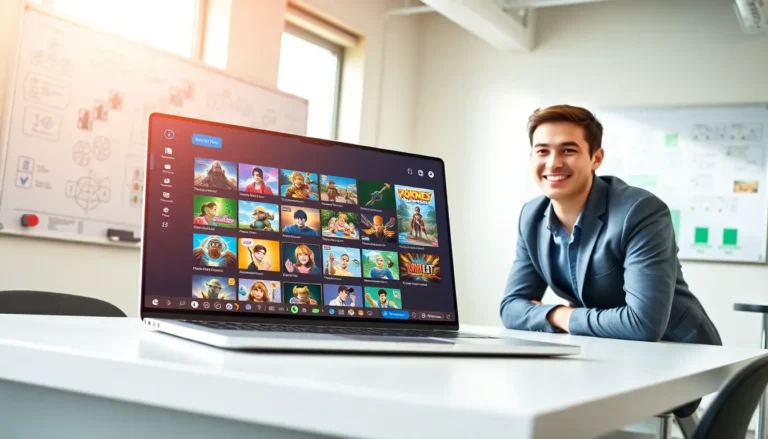Table of Contents
ToggleIn the vast universe of digital entertainment, PC gaming has carved a niche that blends artistry, technology, and community into a cohesive experience. From its humble beginnings to the formidable sector it has become today, PC gaming reflects broader technological advancements and cultural shifts. This exploration traces the evolution of PC gaming, examines the impact of e-sports, and looks forward to emerging technologies that promise to shape the future.
The Evolution Of PC Gaming

The world of PC gaming has undergone transformative changes since its inception, showcasing a rich tapestry of innovation and creativity. The journey began in the late 1970s and early 1980s, with rudimentary text-based games that captivated early gamers.
Key Milestones In PC Gaming History
One of the key milestones was the introduction of gaming consoles in the late 1980s, which sparked competition among developers. The release of games like “Myst” in 1993 demonstrated the potential of CD-ROMs to deliver immersive worlds, while the arrival of first-person shooters with titles like “Doom” and “Quake” in the early 90s revolutionized gameplay mechanics.
With the turn of the millennium, the PC gaming landscape expanded dramatically with the advent of online gaming. Massive multiplayer online role-playing games (MMORPGs) like “World of Warcraft” not only provided extensive gameplay but also established dynamic virtual communities that connected players globally.
The Rise Of Online Multiplayer
The 2000s heralded a golden age for online multiplayer games, with platforms such as Steam launching in 2003, offering easy access to a library of games and revolutionizing digital distribution. The accessibility of high-speed internet allowed players to connect in real-time across vast distances, paving the way for cooperative and competitive online play that captivated audiences worldwide.
Impact Of Hardware Advancements
The evolution of PC gaming is intricately tied to advancements in hardware technology. Each leap forward in specifications has enabled developers to push creative boundaries and enhance the gaming experience for players.
The Importance Of Graphics Cards
At the forefront of this advancement is the graphics card. Companies like NVIDIA and AMD continually push the envelope, introducing increasingly powerful GPUs that deliver stunning visuals and smooth performance. The shift from 2D sprites to 3D rendered worlds showcases the impact of graphics advancements, allowing games to feature lifelike characters and environments. With the emergence of ray tracing technology, for instance, games like “Cyberpunk 2077” challenge players not only with gameplay but also with breathtaking realism in lighting and shadows.
Role Of CPUs And RAM In Performance
Equally important are the advancements in CPUs and RAM. Modern processors and faster memory configurations have drastically improved performance, reducing load times and increasing frame rates.
For example, multi-core processors enable games to manage complex calculations more efficiently, enhancing overall gameplay fluidity. Besides, advancements in RAM technology allow for greater multitasking capabilities, enabling players to run resource-heavy games alongside streaming applications. This synergy of CPU and RAM performance eventually shapes the gaming environments, making them richer and more expansive.
The Influence Of E-Sports On PC Gaming
E-sports has emerged as a formidable force within the PC gaming landscape, transforming casual play into a competitive spectacle that draws millions of viewers worldwide.
Popular E-Sports Titles And Their Impact
Titles like “League of Legends”, “Dota 2”, and “Counter-Strike: Global Offensive” have not only shaped the e-sports arena but have also driven significant investments into gaming infrastructure. Tournaments such as The International and the League of Legends World Championship have reached extraordinary prize pools, attracting sponsorships from major corporations.
These events foster a sense of community and camaraderie among players and fans, elevating gaming to a professional level where high stakes and intense competition reign supreme. As a result, the influence of e-sports has extended beyond gamers to give rise to new career paths in coaching, analysis, and streaming.
The Growth Of Streaming Platforms
Streaming platforms like Twitch and YouTube Gaming have accelerated the growth of e-sports and PC gaming as a whole. By providing a platform for gamers to showcase their skills, these platforms foster engagement and community interaction. Viewers are not merely passive spectators: they become active participants in the gaming culture, influencing trends and behaviors within the gaming landscape. This shift in engagement has further solidified PC gaming’s place in popular culture.
The Future Of PC Gaming
As the realm of technology continues to evolve, the future of PC gaming is poised for groundbreaking developments. Emerging technologies are set to reshape the way gamers interact with their favorite titles.
Emerging Technologies To Watch
Virtual reality (VR) and augmented reality (AR) are at the forefront, transforming conventional gaming experiences into fully immersive environments. With advancements in VR hardware, the barriers between players and digital worlds are beginning to blur. Games like “Half-Life: Alyx” have set a precedent for storytelling and gameplay mechanics, drawing players deeper into the narrative. Also, cloud gaming services like NVIDIA GeForce Now and Google Stadia are enabling gamers to play high-end titles on low-spec devices, providing unprecedented flexibility and accessibility. These innovations will likely redefine the landscape of PC gaming, encouraging more widespread participation.
Predictions For The Next Decade In PC Gaming
Looking towards the next decade, several predictions can be made about the trajectory of PC gaming. The integration of artificial intelligence within gaming engines will likely elevate narrative development and game dynamics, creating procedurally generated experiences that adapt to each player’s style. Besides, the potential for more inclusive gaming through accessibility features is anticipated to broaden the gaming community significantly.
Finally, with ongoing advancements in hardware, gamers can expect even more stunning graphics, smoother gameplay, and increased engagement across platforms. Emphasis on community and social interaction will continue to be a cornerstone of evolution, blurring the lines between gaming and socializing.
Conclusion
To conclude, the journey of PC gaming reflects not only technological advancements but also the profound impact on culture and community. From early milestones to modern e-sports phenomena, the evolution of PC gaming is a testament to the power of innovation and engagement. As gaming continues to evolve, the focus on immersive experiences, enhanced hardware capabilities, and community engagement promises a thrilling future for gamers everywhere.





